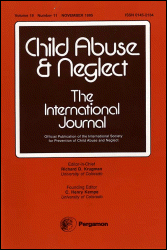| > |
Child Abuse & Neglect provides an international, multidisciplinary forum on all aspects of child abuse and neglect including sexual abuse, with special emphasis on prevention and treatment. The scope extends further to all those aspects of life which either favor or hinder optimal family interaction. While contributions will primarily be from the fields of psychology, psychiatry, social work, medicine, nursing, law, law enforcement, legislation, education and anthropology, the journal aims to encourage the concerned lay individual and child-oriented advocate organizations to contribute.
Read More |
|
 |